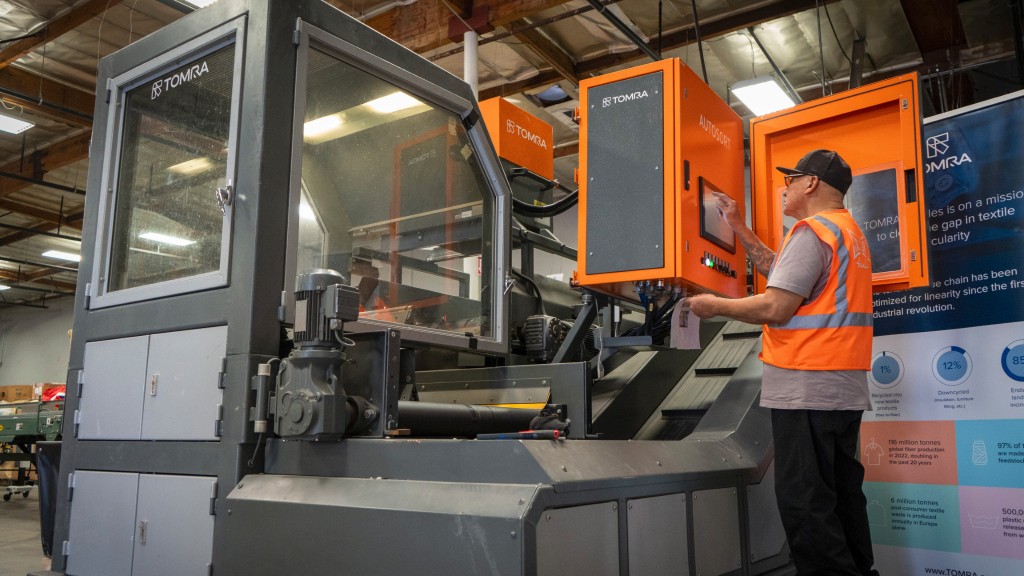Homeboy Threads and TOMRA demonstrate textiles sorting unit to policymakers, fashion brands
TOMRA whitepaper highlights current state of textile recycling and strategies for a circular value chain

Homeboy Threads, the California Product Stewardship Council, the City of Los Angeles Sanitation and Environment Department (LASAN), and TOMRA have hosted an event in the City of Commerce, California, where they were joined by environmental advocates, fashion brands, and policymakers who are working to build circular economy partnerships in Los Angeles, create quality jobs, and reduce the harmful impact of textile waste.
In 2022, a Textile Recovery Pilot Report found that every year, more than 70,000 tons of commercially generated textile waste ends up in Los Angeles area landfills.
The event included demonstrations of a TOMRA Recycling unit that relies on sensor technology to sort textiles by fibre and colour at high volumes. In collaboration with textile recycling partners like Homeboy Threads, the TOMRA Recycling unit presents a solution to an otherwise labour-intensive process required to sort textiles by fibre type. By providing pure cotton material to emerging fibre-to-fibre recyclers and clothing manufacturers, the unit has the potential to change the apparel industries' current take, make, and waste chain, and create a closed-loop textile waste recycling model that protects the environment.
"At Homeboy Threads, we are proud to be one of the only sites in Los Angeles that is already working with globally recognized brands to extend the life of garments and keep textiles out of our landfills," said Chris Zwicke, chief executive officer of Homeboy Threads. "These partnerships allow us to reduce waste, protect our environment, and create quality job opportunities for people who are working to heal and transform their lives."
"Homeboy Threads is Homeboy Industries' most recently launched social enterprise business and it has grown exponentially in just a two-year period," said Thomas J. Vozzo, Chief Executive Officer of Homeboy Industries. "Today's event and our partnerships are a testament to Homeboy Thread's and its potential to do much more, continuing to create skilled, green economy employment and workforce training opportunities for the most marginalized among us."
"We believe that textile sorting technology is very important to advancing circularity in the apparel industry at scale and we're excited to demonstrate our solution here in Los Angeles," said Louisa Hoyes, director of strategic partnerships at TOMRA Textiles. "This project with Homeboy Threads and our other partners demonstrates what we can achieve when we explore new business models together but to meet the greater challenge, we need new legislation and incentives, investments in textile recycling infrastructure, a strong digital core, and above all, collaboration across the value chain."
TOMRA's textile recycling whitepaper
TOMRA's latest whitepaper is titled Transforming Textiles: 4 Key Beliefs to Enable Textiles Circularity. The paper addresses the current state of the textiles industry, strategies, and technologies needed for the transition to a circular value chain.
While the worldwide textile market plays a crucial role in the global economy, the industry's growth in production and consumption over the last two decades has placed immense pressure on our natural resources and adversely impacted the health of our planet. Only one percent of annual textile waste is recycled into new products without downgrading.
TOMRA's whitepaper addresses this issue, examining the linear nature of the textile industry and highlighting the transformative potential within its current processes. TOMRA says that by exploring new strategies and technologies, the industry can chart a course toward a circular textiles value chain, turning waste into valuable resources.
"At TOMRA, we recognize the urgency to reshape the textiles value chain from linear to circular. Our webcast and this white paper serve as essential guides for the industry to leverage immense opportunities for transformation," stated Vibeke Krohn, head of TOMRA Textiles. "We are committed to driving innovation and collaborating with industry leaders to shape a more circular and responsible future for the textile industry."
TOMRA has identified four key beliefs to underpin this new, circular textiles value chain. These key beliefs are:
- Supportive policy, legislation, and incentives to guide and motivate the shift towards circularity in textiles
- Cross-industry collaboration and business model innovation to support profitable and long-term value creation across the textile value chain.
- Investments to scale infrastructure for automated sorting and mature recycling technologies to enable fibre-to-fibre textiles across material types and compositions.
- A digital core to capture data and insights across the textile value chain to allow for transparency and traceability and keep consumers, industry players, and regulators informed.
"Transforming Textiles highlights the critical role of collaboration among industry players, policymakers, and consumers to scale up infrastructure for traceable textile collection, sorting, reuse, and fibre-to-fibre recycling. Together, we can transform the textile landscape into one that prioritizes sustainability and circularity," added Louisa Hoyes, director of strategic partnerships at TOMRA Textiles.



